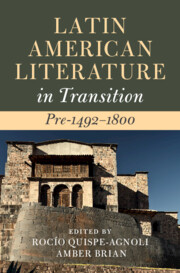Book contents
- Latin American Literature in Transition Pre-1492–1800
- Latin American Literature in Transition
- Latin American Literature in Transition Pre-1492–1800
- Copyright page
- Dedication
- Contents
- Figures
- Contributors
- Acknowledgments
- Introduction Dwelling in Transitions
- Part I Land, Space, Territory
- Part II Body
- Part III Belief Systems
- Part IV Literacies
- Part V Languages
- Part VI Identities
- Chapter 22 Textual Figures and Modalities of Change: The Soldier, the Translator, the Plebeian, and the Woman Chronicler
- Chapter 23 Diego Muñoz Camargo and the Destabilization of the Relación Geográfica: Adaptation and Variation in the Mestizo Chronicle
- Chapter 24 Representing/Erasing the Other in Colonial Brazil’s Eighteenth-Century Epic Poetry
- Index
- References
Chapter 24 - Representing/Erasing the Other in Colonial Brazil’s Eighteenth-Century Epic Poetry
from Part VI - Identities
Published online by Cambridge University Press: 25 November 2022
- Latin American Literature in Transition Pre-1492–1800
- Latin American Literature in Transition
- Latin American Literature in Transition Pre-1492–1800
- Copyright page
- Dedication
- Contents
- Figures
- Contributors
- Acknowledgments
- Introduction Dwelling in Transitions
- Part I Land, Space, Territory
- Part II Body
- Part III Belief Systems
- Part IV Literacies
- Part V Languages
- Part VI Identities
- Chapter 22 Textual Figures and Modalities of Change: The Soldier, the Translator, the Plebeian, and the Woman Chronicler
- Chapter 23 Diego Muñoz Camargo and the Destabilization of the Relación Geográfica: Adaptation and Variation in the Mestizo Chronicle
- Chapter 24 Representing/Erasing the Other in Colonial Brazil’s Eighteenth-Century Epic Poetry
- Index
- References
Summary
This chapter addresses proto-nationalist, Indianist discourses based on early colonial depictions of Brazil’s lands and people in the epic poems Uraguai (1769) by José Basilio da Gama, and Caramuru (1781) by José de Santa Rita Durão. Both poems offer examples of Indianist tradition that would go on to become models for the aesthetic nationalism of the nineteenth century. Given that the eighteenth century represents a coming of age in Brazilian literature, the absence of Africans in these two poems is noteworthy. This essay explores the simultaneous prominence of Natives and invisibility of Africans in colonial Brazilian literary texts and proposes that the mythological idealization of the Indian was used as a pretext to conceal the problem of the “Negro.” As with any ideology, the literary texts that committed to the building of Brazilian nationhood enforced ways of thinking about Afro-Brazilian people that endure through time.
Keywords
- Type
- Chapter
- Information
- Latin American Literature in Transition Pre-1492–1800 , pp. 362 - 376Publisher: Cambridge University PressPrint publication year: 2022

